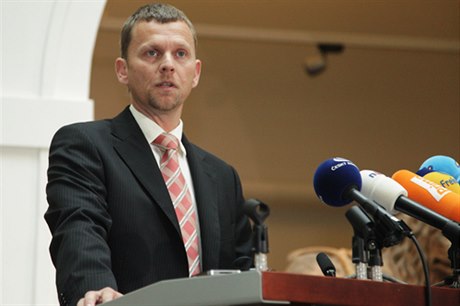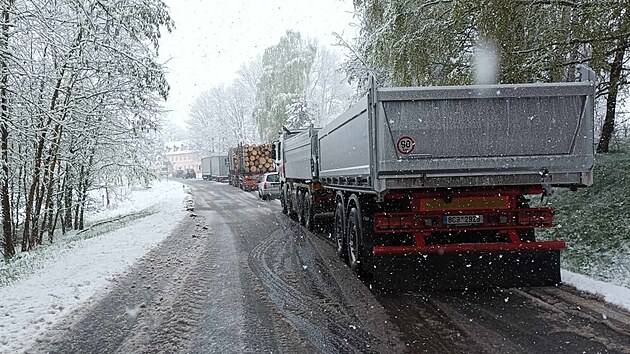Prime Minister Petr Nečas’ (Civic Democrat, ODS) coalition government will likely face a real test of support in June with the second reading vote on church restitution in the lower house of parliament. The restitution deal, counting on the return of around half the property confiscated from the Catholic Church and other religious groups by the former communist regime, and a phased cash payment of Kč 59 billion, is unpopular with politicians and the Czech public.
The left-of-center opposition is roundly against the move, with the most on the government side giving tepid support. MP Michal Doktor, formerly with the ODS and now unaligned, suggests cutting the financial compensation and spreading out the payments over a longer period could save the controversial proposal from being shot down. With a left-wing victory consistently predicted for parliamentary elections that will have to be held within two years, a defeat for the restitution bill would probably put it on the legislative ice for a long time to come.
Q: What are the chances that parliament will approve the government proposal for a property settlement between the church and the state?
DOKTOR: The “restitution project” is threatened. That is because of the quality of the material on which the proposal is based as much as the circumstances surrounding it. It is not possible to ignore the economic context and public opinion. In the context of these things the proposal as it is prepared at the moment is in danger of not being accepted. ‘I would like to stress that more than restitution, this is about a proposed settling of relations between the church and the state, that is a separation of church and state.’
I believe that the church fulfills a much more significant role than some others sorts of legal entities in society. That is why it should be aware that it should be able to adopt a different stance and different fashion of communication.
I would like to stress that more than restitution, this is about a proposed settling of relations between the church and the state, that is a separation of church and state. If the “restitution” side of things is pushed to the fore together with poor communication and a qualitatively poor method [for estimating the damages] then this risks turning the public even more against the church with society taking an extremist stance on the issue.
Q: Do you fear that if the property settlement with the church is not passed by this government then it will be held up long term? I ask because of the extremely critical stand adopted by the Social Democrats (ČSSD) which will probably win the next lower house elections.
DOKTOR: If this project is not dealt with by this government and the parliament in its present form, the next parliament, which will probably have a very left-wing character, will reject the proposal. Bohuslav Sobotka [the leader of the Social Democrats, ČSSD] would likely stall on the ground that rejecting a settlement with the church would be a denial of the efforts of [former Social Democrat premier] Miloš Zeman and the activities of Social Democrats during his period in office. If “restitution” does not go through now, the qualitative settlement of relations between the church and state will disappear for 10–15 years from now on.
Q: Don’t you think that church restitution would be an ever more significant theme as the elections get nearer? Most of the public don’t support it and for the opposition it would be advantageous to pick up the theme later.
DOKTOR: I would not want to see church restitution as an issue for the pre-election campaign under some idiotic and stupid slogan. I cannot think that those who are absolutely opposed to restitution do not understand that the property which should be returned is just lying there unused and is of no benefit to the economy. A good housekeeper just wouldn’t leave things like that during an economic crisis and allow things to continue in this way.
Q: Cyril Svoboda [the former leader of the Christian Democrat KDU-ČSL and ex foreign minister] said in a previous interview with Czech Position that the continuing postponement of the state’s promise to solve the issue of church restitution sticks in the throat of church and that as a result during these unsettled times it can hardly be heard from. Do you think that a restitution deal would allow the church to find its voice again?
DOKTOR: I don’t like it when it is referred to as restitution, instead of that you should focus on the fact that this is mainly about a settlement of relations between church and state. This project has a wider social impulse. The church, which will have means and property at its disposal, will be delivered from dependence on the state. The church will no longer have to beg for money for priests, for the repair of churches and such like. ‘The Social Democrats say they would give the church property and then leave it to starve to death. The communists would like to completely destroy the church.’ That is why I say that the church should be given back its property, people have to understand that this is about the separation of church and state. Connected to this is the hope that Czech society will come to have a better impression of the church.
The church is, however, in a pitiful position because it understand that the restitution project at this time must be basically completed by this government. The left has not sent out positive signals on this to the church. The Social Democrats say they would give the church property and then leave it to starve to death. The communists would like to completely destroy the church. In other words, there are no signs of cooperation with the church from the left.
Q: Why weren’t the Social Democrats more involved in framing the overall settlement? It was clear in advance that the opposition would not agree with the government proposal.
DOKTOR: The negotiating group came up with a concept that it stuck with. The talks took the form of the government negotiators on one side of the table and the church negotiators on the other. This exclusive format was perfectly capable of coming up with an exclusive concept which is not able to perceive some connections and recognize some of the changes that have occurred in society over the last six years.
The economic and financial situation of the Czech Republic has changed over that period. Six years ago it would have been possible to call on sufficient economic resources, now, however, these sources are reduced and we need time to fund new ones. What’s more its difficult to ask representatives of the ODS, TOP 09 and Public Affairs to second guess the thinking of representatives of the ČSSD and KSČM.
Q: Wouldn’t it be strategically more advantageous and prudent to agree on the final form of the proposed bill with the Social Democrats? It clear in advance the they will soon get back into power.
DOKTOR: I would not blame them for that. What I would blame them for is the qualitative manner in which they came to the agreement. It avoids the fact that property will be returned that was not absolutely, always and everywhere owned by the church, as is the case for restitution for individuals. There is another sort of basic definition here about what should be returned and which estimates the financial settlement on what is not given back. This can either be accepted or rejected by parliament.
It is perhaps necessary to underline that this is a political decision which takes a qualitative stance on the property that will be given back to the church and which it will be expected to be able to take advantage of and benefit from. It will also get a financial settlement that will be the guarantee of the separation of church and state. It is taken for granted that the church should be able to make use of the property returned to it, increase its value, and accumulate enough means to make real use of it.
Q: But if this project is not abused and it’s not used as a means for different frivolities….
DOKTOR: If restitution is badly formulated and the project poorly prepared then it will send a poor signal to the public
Q: And what is your solution? Will you back the government proposal?
DOKTOR: I would certainly cut the financial settlement of Kč 59 billion by 10-15 percent. I would also allow the payments to be extended over a longer time frame. I would see a solution in cutting the financial sum.
Q: Will you make that sort of amendment in the second reading in the lower house?
DOKTOR: When the majority has completed its changes to the basic format of the proposal I will give a mind to the amendments.
Q: Would you seek to form a broader working group? Have you ascertained in advance how many members of parliament would vote for your amendment to the government proposal?
DOKTOR: I am mostly talking to my wonderful colleagues at the plenary sessions and trying to get them to sign up to my proposal. When it comes to the vote everyone will decide according to their own conscience.
Q: So you can’t say ahead what sort of chance your proposal might have?
DOKTOR: I don’t want to anticipate, we still have the second reading before us.
Q: How many of your former colleagues from the ODS will, according to you, not vote in favor of the government proposal?
DOKTOR: There will be several and their names have cropped up in the media, for example Pavel Bém, Boris Šťastný, Lenka Kohoutová, Ivana Weberová and Jana Černochová. It’s useless trying to put them in the same bag and make some block out of them. They have individual standpoints as members of parliament. But they are all aware that if this parliament does not back the proposal then there will not be another one for a long time. If this project cannot be completed then it will be a very stupid and indefensible gesture.





